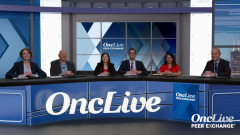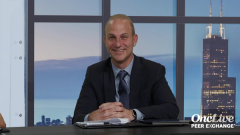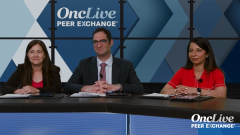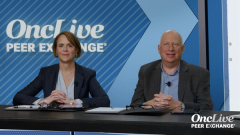
Selecting Appropriate Adjuvant Chemotherapy for Early-Stage NSCLC
Shared insight on the role and selection of adjuvant chemotherapy for patients with early-stage non–small cell lung cancer.
Episodes in this series

Transcript:
Benjamin Levy, MD: Heather, what are your rules for adjuvant chemotherapy? What’s the size cutoff and how do you do this at an everyday practice?
Heather Wakelee, MD: As Alex said, it’s definitely a shared decision-making discussion. The 4-cm number, for better or worse, is what we have. If someone has a 3.8 cm tumor that had some aggressive features to it, and they really want to do everything possible, I will offer them chemotherapy. But if it’s a 4.5cm tumor, no nodes involved and someone is older and somewhat frail, I probably won’t.In both cases,I will really talk about and definitely try to frame it in terms of how is this really going to impact the patient in terms of cure and so, I use that at about 5%— changing cure. Because when you start talking about hazard ratios you lose almost everybody, but if you can put it in terms of 5% difference in survival at 5 years, then people can weigh is that worth 3, 4 months of chemo and we can weigh, “Am I going to cause permanent kidney damage?” Which is going to impact them within 5 years, among other things. So, it’s kind of weighing all of it, just like we do with the radiation as well.
Benjamin Levy, MD: I think it’s a great point. I think if there’s ever shared decision-making that needs to happen, it’s with the role of adjuvant chemotherapy for resected disease and sharing with them what the real benefit is in the context of toxicity. So, speaking of toxicity, Alex, cisplatin, carboplatin? The data— interestingly enough—that 4-cm cutoff was from a carboplatin-adjuvant study that was negative.
Heather Wakelee, MD: But followed up with other subanalysis.
Benjamin Levy, MD: That’s it, so, most of the data we have prospectively is cisplatin based. Is there a role with carboplatin?
Alexander Spira, MD: So, am I a tumor board, or…
Benjamin Levy, MD: This is off the record.
Alexander Spira, MD: So, off the record. On the record, I’m a cisplatin guy. I mean, the data is with cisplatin, the original IL data. I remember when it came outbecause I was actually writing a review with my old mentor, your institution, we had to change the review because it came out a month after, but it was all cisplatin-based therapy. Now, if I have an 80-year-old [female] patient, with a creatinine of 1.2 and a 4-cm tumor, I’m not giving it. But if I have an 80-year-old who’s got an N1-resected, or even N2-resected disease, I’m all about the carboplatin. I think you have to make these real judgments.
Benjamin Levy, MD: I’ve heard a lot, and we’ll talk about the neoadjuvant data, a lot of carboplatin used in that neoadjuvant study, and some people have extrapolated, say “OK, it’s time to start using just adjuvant carboplatin.”
Alexander Spira, MD: You know, it’s interesting because, if you look from a purist standpoint, it should be cisplatin. That’s what it is. But all the neoadjuvant studies do allow you to use carboplatin,which, is surprising because, as part of a clinical trial, the gold standard should be the gold standard.
Heather Wakelee, MD: I think in the neoadjuvant setting with the carboplatin, you can see what you’re doing. In the adjuvant setting, you’re flying blind, right? And that’s where that cisplatin, where, even in the metastatic setting, we’ve proven in multiple studies cisplatin’s better than carboplatin, from a survival benefit, but it’s small, and so we don’t think that toxicity difference is worth it. But in adjuvant, where you’re only given maybe a 5% and if you give carboplatinit’s maybe 3, and then, why even give it? So, it’s not that I haven’t done it sometimes [laughter] but, you know …
Alexander Spira, MD: Off the record.
Heather Wakelee, MD: But, you’ve got to weigh it.
Jonathan Wesley Riess, MD: But in that patient, that 80-year-old, with elevated, mildly elevated creatinine with a 4-cm tumor, if I can’t give cisplatin for a 4-cm tumor; I’m probably not going to give carboplatin.
Alexander Spira, MD: No, I agree. And talking, in a resected…
Benjamin Levy, MD:Jessica, you wanted to say something?
Jessica Donington, MD: It’s like… you guys asking me about sutures, but….
Alexander Spira, MD: I wouldn’t ask you about sutures…
Jessica Donington, MD: I’m talking about this as a pair in the neoadjuvant setting with IO [immunotherapy], isn’t the carboplatin arms all performing better, or is it just me?
Benjamin Levy, MD: Yes, yes.
Heather Wakelee, MD: There aren’t any cisplatin arms in the neoadjuvant - the only randomized data we have really was CheckMate816 [NCT02998528], which one…
Jessica Donington, MD: And it wasn’t random, right?
Heather Wakelee, MD: It’s carboplatin-based. We don’t have cisplatin-based studies in the neoadjuvant setting yet. We will, but they’re not done yet.
Benjamin Levy, MD: I think the only time —you’re right, as a purist, I think adjuvant cisplatin is the way to go—there was some data from a SEER [surveillance, epidemiology, and end result] analysis a few years, maybe 5, 10 years back showing that carboplatin performed almost as well as cisplatin—and it is less toxic. On the record I don’t give it, off the record I will tell you there are times that I would give it to the right patient.
Transcript edited for clarity.










































